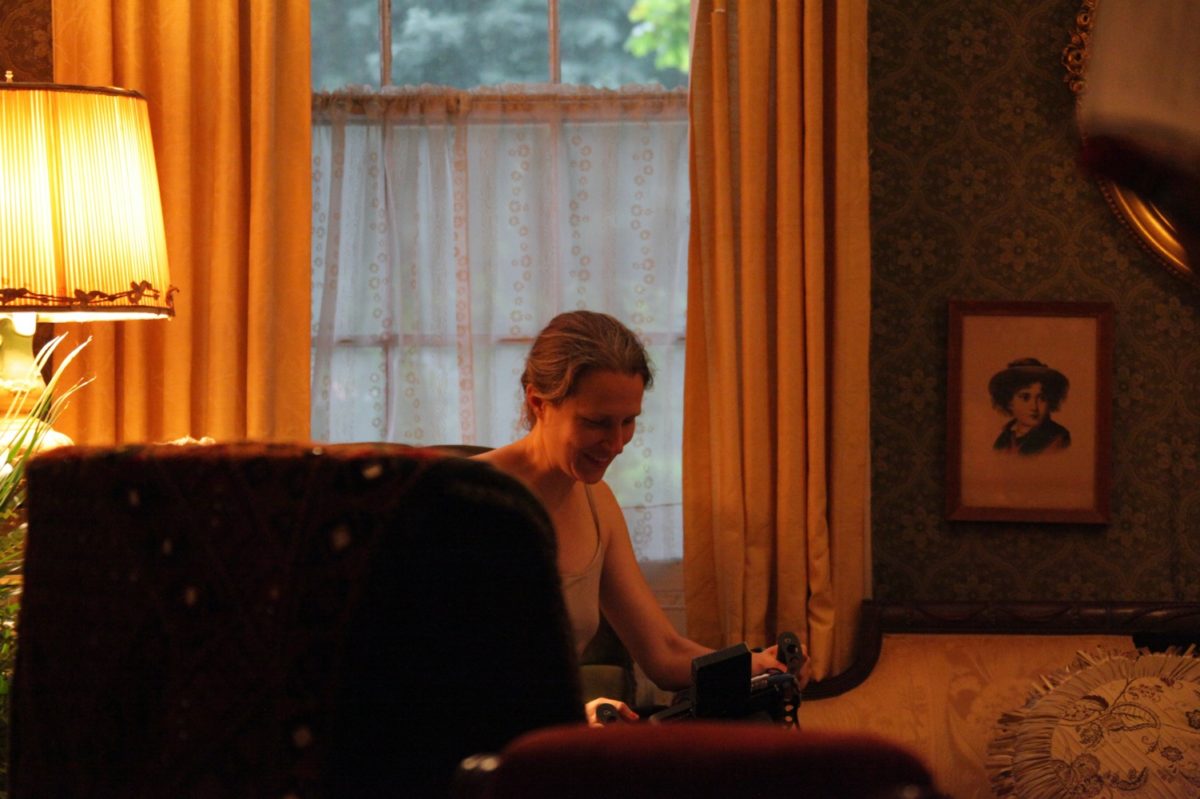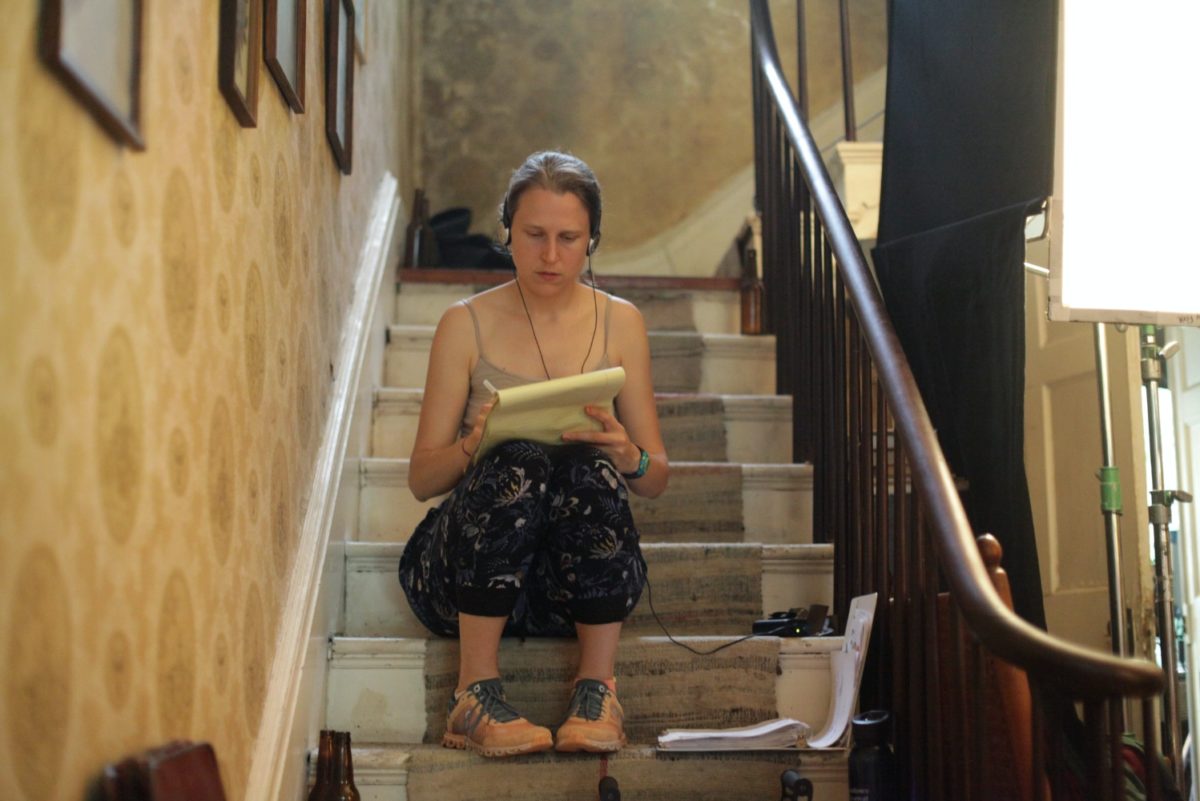Following her back-to-back first features Thou Wast Mild and Lovely and Butter on the Latch, director Josephine Decker returned with Madeline’s Madeline, a genuinely thrilling, endlessly imaginative look at the creative process as well as how mental illness influences artistic expression. She’s now back with Shirley, an inventive drama loosely drawing from author Shirley Jackson’s life, featuring the impressive leading duo of Elisabeth Moss and Michael Stuhlbarg.
As part of a digital press day, we had the opportunity to speak to Decker about her latest project, which NEON has released on Hulu and many other platforms. We discussed capturing the feeling of spontaneity, her thoughts on biopics, collaborating with Martin Scorsese, themes of isolation and repression, and much more.
The Film Stage: Spontaneity is such a hard thing to capture. I remarked how the way you move the camera feels like the audience is in a dance with the characters. I’m curious from a technical point of view how are you able to pull that process off, from pre-prep to actual shooting?
Josephine Decker: A lot of that was [cinematographer] Sturla [Brandth Grøvlen]. One of the reasons I wanted to work with him as a DP is that he is a wonderful handheld operator. He had done this gorgeous movie Heartstone, which I feel like no one in America has seen, but it is so beautiful. I just thought he had a really sensitive eye and a way of dancing with the people he was connecting too. I think when you have a sensitive DP who is really available emotionally to the actors, you can really feel the actors in a different way. So a lot of that was spending time ahead of time talking about different philosophies and then really unleashing him when we got to the shoot, and depending on the scene, letting him roll and discover with the actors. He had different philosophies depending on the different scenes.
You’ve said that this is not a biopic although it perhaps could be considered a non-traditional one. I’m just wondering if there are any unconventional biopics that you consider amongst your favorites that were perhaps an inspiration?
Gosh, I don’t know if there are many biopics I’ve even liked. I can’t think of a single one now, to be honest. They are usually not that entertaining. [Laughs.] I didn’t really want this one to be a biopic, and I don’t know if it really is. It’s adapted from a fictional novel about Shirley Jackson, so it’s definitely a work of fiction. It’s almost as if you put the audience into a Shirley Jackson story, that was kind of our goal of the film. What are some of your favorite biopics?
One that comes to mind is Todd Haynes’ I’m Not There or even his films Velvet Goldmine and Superstar: The Karen Carpenter Story.
I never saw Velvet Goldmine, but I’m Not There is amazing. You’re right. See, that’s good. If you’re going to throw me into a category, throw me into that category. [Laughs.]
Yeah, it’s a way in, but it’s a totally different experience than a standard biopic that you are getting with Shirley.

I was at the Sundance premiere and the film has somewhat of a new resonance now. It’s all about isolation and creativity and what you can do on your own. I’m sure your initial plans for the film have shifted a bit given the situation we are in, but has that resonance struck a chord with you at all and what do you hope audiences will take away from the film now that it is going to be available everywhere?
It’s nice to be able to put new content into people’s laps, especially at a moment where I feel like people are looking for new content as an outlet and escape. There is something really exciting about seeing this window into Shirley’s life. She was kind of cloistering herself off at this moment in her life, but it was also a very generative moment. It was a moment where she was doing some deep reckoning. I think that feels very similar to what people are going through right now–this kind of enforced stillness is bringing up a lot and allowing, hopefully, some people to really confront themselves. I hope that thematically, the movie really captures people’s attention. It’s also a movie that is filled with wonder and mystery and everyone needs more of that.
During this lockdown time, are you catching up on films you’ve always wanted to see, or reading books or writing?
We had a baby this fall, so I have a six-month-old. The main thing that is happening is that I get to spend more time with her. That is the biggest blessing of the world. I’ve also been Zooming with my family and we have been reading poetry to each other on Sundays, which is extremely special. So in terms of family stuff, my heart is really filled.
The film is also executive-produced by Martin Scorsese, and I believe he had seen your earlier films. He is such a champion of independent cinema. I’m curious how he came on board and what your relationship is like with his work?
Yes, a programmer who had programmed my work at First Tiime Fest, she kept saying to me, “Martin Scorsese really wants to work on something with you.” And I was like, “What?” I kept thinking she had me mixed up with someone else. I was like, “There’s no way.” She said, “You should just sit down with his assistant and talk about collaborating.” And I did, and she said, “Oh, Marty loves Butter on the Latch.” I kept thinking they must have still had the wrong person until I got to actually talk on the phone with Martin Scorsese and he said, “I love Butter on the Latch.” And I was like, “What!” [Laughs.]

I realized after the fact that there is a lot in there that is up his alley in terms of mixing docufiction and music, and a bit of dark violence. So there’s a few elements he’d be into. So we just connected over that and I still can’t believe he is on as an EP. It feels like that thing that is not really happening but it apparently is. He gave some notes on the film towards the end. In his work, I feel like he loves to play and there’s a realism that is so real. It’s larger than life but it is still so, so real. I recently rewatched Goodfellas and the way he uses crowds and backgrounds, there is something so alive in his choices. There is so much that I have to learn from him and it’s been fun to reconnect with some of his early work especially and feel his resonance. He’s uncovering how do you do things with the image? And I feel that’s what I’m always doing. He is such a genius and his work with actors is so spectacular. He clearly makes a very fun, safe film set where people get to be themselves which is exciting. And they are so lively! His movies are just so alive and full and rich.
Yeah, He just shot a new short film during quarantine.
Decker: Oh, really?
Yes, premiering on the BBC.
How does he do so much? I really don’t know how he does as many things as he does.
In the film, you’re dealing with this kind of era of repression in America, especially for Shirley’s character, but you can also see it extrapolated in the younger couple. How do you think these themes resonate for viewers today?
I feel like a lot has changed for female artists in the last few years, but I think there is still a long way to go before women have the same opportunities and the same pay as men. One of the big reasons we wanted to make this movie in the first place–beyond the fact that Shirley’s writing is so wonderful who wouldn’t want to make a Shirley Jackson movie? It personally feels like a gift to me because I am so interested in that way of storytelling and her sort of collapsed realities of storytelling. She is a super famous, really successful artist who for some reason isn’t necessarily a household name, but I feel like she should be. I feel like we should be crediting her with how horror has evolved over the last 100 years, and if there is anything to say about legacy… part of the impetus to make this film in the first place was to draw more attention to her and her work and to feel more connected to more of her writing, to more than just The Lottery, but to know her has a name. She had this way of doing horror that was really edgy and exciting and really very much her own and had more to do with maybe folk ballads than maybe it did with other writing. It’s just exciting to draw more of her work out into the open than it already is.
Shirley is now available on Hulu and more platforms.
